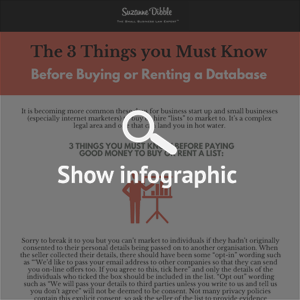
It is becoming more common these days for business start up and small businesses (especially internet marketers) to buy or hire “lists” to market to. It’s a complex legal area and one that can land you in hot water so pay close attention to theses 3 things you must know before paying good money to buy or rent a list.
1. Sorry to break it to you but you can’t market to individuals (see my post on email marketing for the distinction between an individual subscriber and a corporate subscriber) if they hadn’t originally consented to their personal details being passed on to another organisation. When the seller collected their details, there should have been some “opt-in” wording such as “‘We’d like to pass your email address to other companies so that they can send you on-line offers too. If you agree to this, tick here” and only the details of the individuals who ticked the box should be included in the list. “Opt out” wording such as “We will pass your details to third parties unless you write to us and tell us you don’t agree” will not be deemed to be consent. Not many privacy policies contain this explicit consent, so ask the seller of the list to provide evidence that they have obtained the consent of their list.
2. You can’t rely on the “soft opt in” rule (being the rule where you can send information of similar products or services to existing customers (or individuals who had expressed an interest) as long as you provide the right to opt out) and may only market to individuals if express consent as set out above has been provided.
3. You may only market to individuals who have expressly consented to receiving the relevant type of information from third parties if:
a. They have not already contacted you requesting an opt-out;
b. You provide your identity and contact details when you contact them; and
c. You provide a valid contact address for opt-out requests.
If you fail to check whether you have the right to market to the individuals on your list and an individual objects to your contact and reports you to the ICO, you could face an investigation and a hefty fine of, in theory, up to £500,000. So make sure you ask the right questions of the Seller. Ideally you should ask your lawyer to draw up a database sale agreement (particularly where the list has a large price tag) which would include warranties and indemnities from the Seller confirming that the individuals on the list had provided the necessary consent and that the Seller owned all intellectual property rights in the database.
Of course, we can help you with a database sale agreement, so if you want to secure your investment in the list, get in touch with us!
© Suzanne Dibble, business law expert, 2013













